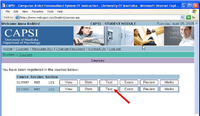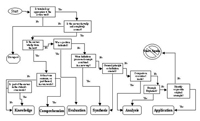|
CAPSI GLOSSARY
AI
Associate instructor.
APA
style
A widely accepted style endorsed
by the American Psychological Association for formatting
papers, articles, chapters, and other scholarly documents.
Among its many applications, computer-aided personalized
system of instruction (CAPSI) is an efficient and effective
method for teaching APA style to students in courses that
require them to write papers in APA style. (Synonym: APA
format)
Associate
instructor (Abbreviation:
AI) See Teaching assistant.
Blended
learning
A blend or combination of two
or more instructional systems within a course. For example,
the combination of computer-aided personalized system of
instruction (CAPSI) and the lecture method.
Bloom's
taxonomy
A hierarchical classification
system for categorizing the level of thinking required for
answering specific questions on a test or exam. Questions
are categorized as being, from the lowest to highest levels,
at the level of knowledge (level 1), comprehension (level
2), application (level 3), analysis (level 4), synthesis
(level 5), and evaluation (level 6). Bloom's taxonomy is
useful for categorizing study questions, questions on unit
tests, and student answers.
CAPSI
Computer-aided personalized
system of instruction.
Computer-aided
instruction
The use of computers to mediate
instructor-student and student-student learning interactions.
(Synonym: computer-mediated instruction)
Computer-aided
personalized system of instruction. (Abbreviation: CAPSI)
A method of delivering personalized
system of instruction (PSI) by means of a computer. Typically
students receive feedback from more advanced students in
the same course.
Computer-assisted
instruction
The use of computers to support
or carry out instruction. The computer may mediate instructor-student
and student-student learning interactions, or the instruction
may be done by the computer with no other learning interactions
occurring through the computer. (Synonyms: computer-based
instruction, e-learning)
Computer-based
instruction. See Computer-assisted
instruction.
Computer-mediated
instruction. See Computer-aided
instruction.
E-learning.
See Computer-assisted instruction.
Exam
A test of a student's overall
knowledge of material. In computer-aided personalized system
of instruction (CAPSI) exams test material covered in a
specific number of units and are typically given a numerical
score rather than a pass/restudy decision.
External
proctor. See Proctor;
Mentor.
Final
grade
The grade a student receives on
a course as a whole. See grade. (Synonym, chiefly British
and Canadian: final mark)
Final
mark. See Final grade.
Grade
Noun: In computer-aided personalized
system of instruction (CAPSI), a numerical or alphabetical
score based on the number of unit tests a student has completed
and the student's performance on other components (if any)
of a course.
Verb: (1) In personalized system of instruction (PSI), to
make a pass/restudy decision on a student's performance
on a unit test; (2) to assign a grade to a student's performance
on any component of a course or to the course as a whole.
(Synonym, chiefly British and Canadian: mark)
Grader/Marker
A person hired at a level below
that of teaching assistant to grade (or, typically in the
British or Canadian educational system, mark) student work.
In a course taught using computer-aided personalized system
of instruction (CAPSI) a grader/marker may act as a mentor.
Instruction
The direction of the learning
of individuals in a particular subject, content area, or
skill. (Synonym: teaching)
Instructional
system
A method of providing instruction
based on an underlying pedagogical philosophy. (Synonym:
system of instruction)
Instructor
A person who directs the learning
of others in a particular subject, content area, or skill.
(Synonym: teacher)
Internal
proctor. See Proctor;
Peer reviewer.
Keller
plan
Another name for personalized
system of instruction (PSI), after its originator, Fred
S. Keller. See Personalized system of instruction.
Learner.
See Student.
Mark.
See Grade.
Mastery
In computer-aided personalized
system of instruction (CAPSI), having learned a given unit
of material to a close to perfect level, as indicated by
being able to completely and correctly answer a random set
of questions from the unit.
Mentor
In computer-aided personalized
system of instruction (CAPSI), a person who is external
to a course and who reviews unit tests. A mentor is typically
a student who has already taken the course and may be in
a more advanced course. The role of mentor is often performed
by a teaching assistant or grader/marker. (Synonym: external
proctor)
Pass/restudy
decision
A decision as to whether a student
has mastered a given unit of material or should restudy
the unit.
Peer
reviewer
In computer-aided personalized
system of instrution (CAPSI), a student who makes a pass/restudy
decision on the mastery of another student on a given unit
as indicated by the latter student's performance on a unit
test, where both students are in the same course (see Review).
(Synonym: internal proctor; student grader)
Personalized
system of instruction. (Abbreviation: PSI)
A method of instruction
in which students progress through units of material sequentially,
demonstrating mastery on each unit before proceeding to
the next unit. Typically students proceed through the units
at their own pace and receive feedback on their mastery
of a unit from more advanced students. (Synonym: Keller
plan)
PI
Programmed instruction.
PR
Peer reviewer.
Proctor
In personalized system
of instruction (PSI), a student who reviews another student's
performance on unit tests. There are two types of proctors:
(1) an external proctor is a student who have already taken
the course or has otherwise already learned the course material
(Synonym: mentor); (2) an internal proctor is a student
who is in the same course as, but has completed more units
than, the writer of the unit test (Synonyms: peer reviewer;
student grader)
Programmed
instruction. (Abbreviation: PI)
A method of instruction
in which students proceed through segments of material called
frames, where each frame contains a small amount of material
and students answer a question about the material before
proceeding to the next frame.
PSI
Personalized system of instruction.
Review
To provide feedback or make
a pass/restudy decision on a unit test.
Student
A person who learns through exposure
to a method of instruction. (Synonym: learner)
Student
grader. See Proctor.
(Synonym: peer reviewer)
Study
questions
Questions that students
are given to help them master the material in the units.
A unit test generally consists of a random sample of the
study questions for the unit.
System of instruction. See Instructional system.
TA
Teaching assistant.
Teacher.
See Instructor.
Teaching.
See Instruction.
Teaching
assistant. (Abbreviation: TA)
An individual hired to help an
instructor with a course. In a course taught using computer-aided
personalized system of instruction (CAPSI), a teaching assistant
may act as a mentor. (Synonym: associate instructor)
Test
writer
A student who writes a unit test.
Unit
In personalized system
of instruction (PSI), one of a numerically ordered set of
segments of material on which students must demonstrate
mastery before proceeding to the next unit.
Unit
test
A test of a student's mastery
of a specific unit of material. A unit test is typically
based on study questions provided to the students before
they attempt the test.
WebCAPSI
The name of a specific Web-based
program for delivering computer-aided personalized system
of instruction (CAPSI).
|




